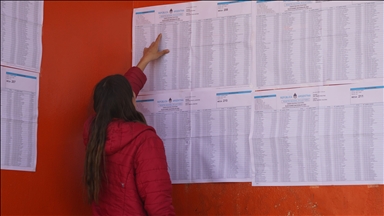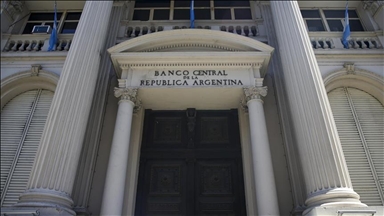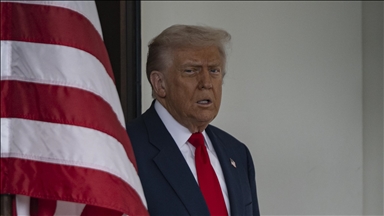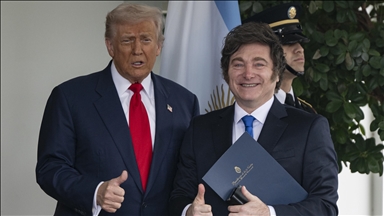Argentina's all-or-nothing midterms: Referendum on President Milei
Sunday's vote could determine legitimacy, longevity of Libertarian’s mandate
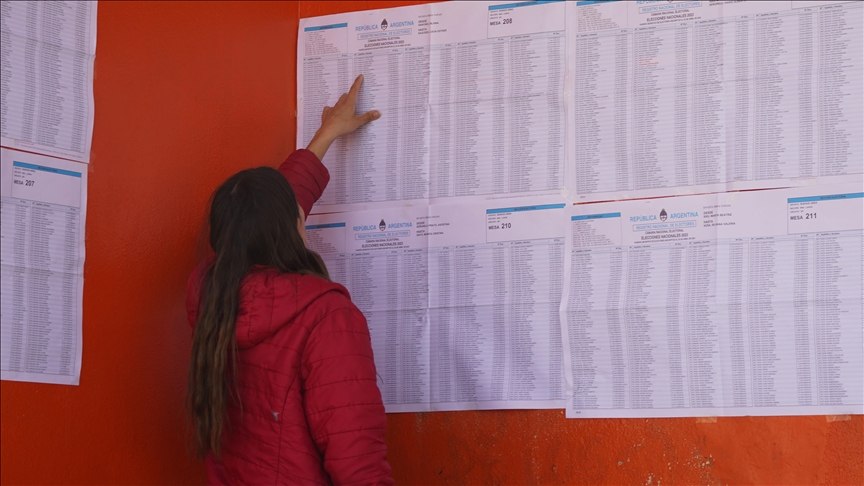 File photo from November 19, 2023, Argentines vote in the run-off presidential election between Economy Minister Sergio Massa and Javier Milei in Buenos Aires, Argentina
File photo from November 19, 2023, Argentines vote in the run-off presidential election between Economy Minister Sergio Massa and Javier Milei in Buenos Aires, Argentina
BOGOTA, Colombia
Argentinians will head to the polls Sunday for midterm elections, where they will elect new lawmakers for both chambers of the national Congress.
One-third of the Senate and half of the Lower House will be renewed. The race comes two years into President Javier Milei’s far-right government was elected and will be key for the remainder of his term. These are not just legislative elections; they are widely viewed as a referendum on what Milei has done until now.
From the start of the campaign, the president has given national weight to the vote and even the air of a plebiscite on his government and its economic and social agenda. The framing is a high-stakes move for a president who governs without a legislative majority.
Juan Bautista Lucca, a professor and investigator at Conicet, Argentina´s most important scientific funding and research body, noted that the government has set the terms.
“The government seeks to assert itself or validate its position, and that is why President Milei has stated that it's either the government's direction or a step backward,” Lucca told Anadolu.
Milei’s national ruling party, La Libertad Avanza (LLA), holds a meager 37 seats in the 257-seat Lower House. Thanks to its key alliance with the PRO, the conservative party of former President Mauricio Macri, LLA wants to expand, hoping to secure at least one third of parliament, which would grant it a blocking minority.
The results, however, will be key to gauging public support for the administration. Professor and researcher at the National University of Cordoba, Juan Martin Zanotti, framed the outcome as a measure of the government's current standing.
“That is a bit like a thermometer and a measure of the level of support, of adherence to the administration. If it is closer to 30%, it would be in a kind of crisis situation or a loss of support, and if it is closer to 40%, then it will be considered a victory,” he said.
The main opposition Peronist coalition will compete under the name Fuerza Patria in 12 provinces plus Buenos Aires City. Peronist candidates will run under different coalition names in the 11 remaining provinces, reflecting the fractured nature of the opposition.
The elections are particularly important because Milei has already suffered his worst electoral defeat since taking office last month. In legislative elections in September for Buenos Aires province, home to almost 40% of the country’s electorate, the coalition led by Milei was beaten by the opposition 47% to 34%.
The president acknowledged the “clear defeat” and admitted to having made “political mistakes” that “we will accept, process and correct.” But he declared he would not “retreat by a single millimetre in government policy.”
Experts widely agree that, as a party that was little-known in the last midterms, LLA will almost certainly gain legislative representation, although the final number is likely to be lower than what the government wants.
The real significance lies not just in the number of seats gained, but in the government's ability to carry out the agenda for which it was elected. If the government does attain the results it is expecting, it would secure governability.
A strengthened bloc could prevent presidential decrees from being vetoed, could halt impeachment initiatives against the executive, and would push forward bills with the support of new allies. If it falls short of its goals, promoting its ambitious agenda will remain an uphill battle.
“The president will increasingly need a strong, majority legislative contingent to be able to govern, and that is his great urgency,” said Lucca. “And on the other hand, one that allows him to protect himself against eventual impeachments or legislative insistence on overturning the vetoes that the president is systematically proposing. So, this result will determine much of the government's survival.”
Milei has been able to govern, although with difficulty, since coming to power two years ago, despite lacking majorities in Congress.
He has vetoed different bills that would have increased pensions and disability benefits. But last week, Congress took a step not seen in more than 20 years and overturned the president’s veto, signaling the opposition’s power when united.
“The government will try to appear victorious in this national photo op, but percentages are important to gain an impact on how much legitimacy this economic plan has,” according to Zanotti.
La Libertad Avanza and Milei are extremely new political forces, having been around since 2021 at most. Lucca said their legislative success has been strong in a short period as it has been progressively increasing.
The Chamber of Deputies in 2021 had two legislators from Libertad Avanza. In 2023, when Milei won the presidency with more than 50% of the vote, the legislature had 33 legislators from LLA.
"And without a doubt, after this election, there will be many more,” said Lucca.
But a question remains.
“The problem is that we need to see whether this flash will continue to illuminate Argentine politics or whether it is actually an epiphenomenon, a mere flash in the pan that makes a lot of noise and then disappears,” he said.
While the opposition is fragmented, it is still a formidable force, and the anti-Milei vote is also gaining more strength. Milei’s negative image numbers are on the rise, reaching almost 48%, while his government’s approval rating is falling, according to a survey by Management & Fit.
“Before the Buenos Aires election, there were almost guarantees of a possible reelection, and now we are facing a different scenario,” said Zanotti
Signs of Milei’s growing unpopularity were already evident when, nearly two weeks ago, he was pelted with stones by demonstrators while campaigning.
“It's a Goliath that is no longer as invincible as it seemed in the 2023 election,” according to Lucca.
Currently, LLA holds 37 seats out of 257 in the Lower House and six of 72 in the Senate. The largest opposition bloc in both chambers is Peronism, with 98 deputies and 34 senators.
Management & Fit has forecast LLA could win between 39 and 47 seats in the Lower House, potentially getting it up to 84 deputies if combined with allies. It could secure the support of at least one-third of Lower House seats, which would help them block the opposition’s bills and uphold Milei’s presidential decrees.
It means that despite their likely considerable gains, LLA will still need to negotiate with other blocs -- a difficult prospect for a president who has shown little inclination for traditional political deal-making.
The results of the election are also a crucial indicator for the next presidential race.
“Generally speaking, Argentine political history shows that if you do well in the midterm elections, you will do well in the next ones,” said Lucca.
Ultimately, the stakes of the vote transcend domestic politics. The government has framed the election as a moment of profound national choice.
“It is the government itself that is saying that the future of the country and the future of the economic model are being defined here. It's an all-or-nothing gamble,” said Zanotti.



